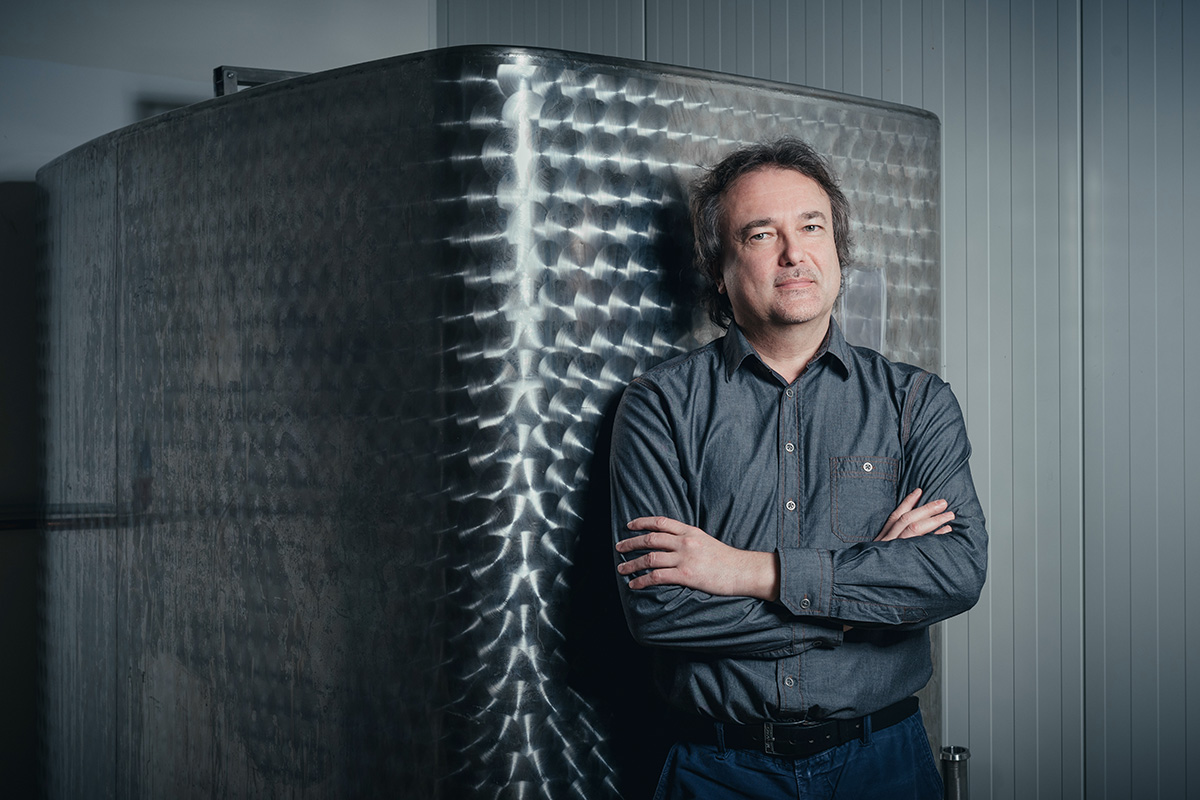The tradition of the family distillery Metelka still continues in Vyškov. The top-quality products are essential for the company and many new are yet to come. Metelka liqueurs have found their way to foreign markets. They are about to be available in the shop in Vyškov soon.
Milan Metelka managed to build a successful distillery which has been able to follow a long family tradition of spirit production in Vyškov. He is the CEO of the company of Milan Metelka Plc. It’s one of the biggest producers of milky liqueurs and absinthes in the Czech Republic. About 45% of the production is exported to foreign markets thanks to the fact that the company has become a part of the R. Jelinek Group SE.
The tradition of liqueur production in your family dates back to 1930s. Can you tell us about this story?
The Metelka Company started its production in 1935 but due to political events the company was involuntary shut down in 1948. At the time of totalitarianism, the subject was quite talked about but grandparents didn’t want to expose their children to these unpleasant experiences because they feared about children’s future. No wonder after all these events they were through.
What was the main reason to start to run a business in this field with the long family tradition?
I was born in Vyškov and I’ve always wanted to stay there. I have that town in my heart. I graduated from the Secondary School of Technology, then I served military service and after that I worked at Research Institute. However, I didn’t want to be just an employee. I wanted to be my own boss. That’s why I started to think about my own business in my hometown. It was logical for me to aim for the field in which my family have had a tradition.
You started the production of liqueurs under the Metelka brand in 1992. Who supported you the most?
My family and wife supported my vision to re-establish the Metelka brand which focuses on liqueur production. They helped me a lot at the beginning. My father provided me with basic information about production of liquors and I searched other information in the libraries. I spent a lot of time self studying. Unfortunately, the old family recipes weren’t available in physical form but my father told me everything he remembered. In addition, the liqueurs made by the Metelka Company in 1940s were extremely sweet and bitter and current customers have completely different requirements for liqueurs’ flavour and aroma. So we started from the bottom.
When you look back, how did the start of the Metelka Company look like?
We started in a family house as a very small company. There was a one room which was used as a factory, a warehouse, an office, and basically anything you could think of. I got a bank loan to start my business and after the final payment I got another loan. It was necessary to invest into better technology and expanding production. The start of the business wasn’t easy. Especially money was an issue. I always remind this experience to my sons. For example, when I went downhill in my old car I used to turn off the engine to save money. It might sound hilarious now but the situation was quite serious. It sometimes happened that I loaded a box full of liqueurs and tried to sell them in local shops but I didn’t sell anything. Nothing! Not a single bottle.
That must have been very depressing. What was the reason to not give up?
The fact that I didn’t give up was thanks to my parents’ support. My dad was the one who kept my feet on the ground and urged me to be careful and consider every possible risk. My mum is younger than my father and she greatly supported me when I started new projects.
What was the reason to transfer the company to a joint-stock company in 2009?
The Metelka Company has become a member of the Union of Producers and Importers of Spirits. The other prestigious members are Rudolf Jelínek, Becherovka or Fernet Stock. All these companies existed during the Communist era so they had solid background but we had to start from the bottom. I’ve met many important people in the Union and I’ve become friends with the owner of the Rudolf Jelinek Company. We’ve shared the same business visions and that’s how the idea of a business connection has been set. This decision has helped the Metelka brand to gain popularity abroad. Since the Metelka brand has become joint-stock company and the two companies have shareholding links between them, Rudolf Jelínek has expanded their product range with Metelka products.
So, you didn’t have any fear of the other competition or operating under such a strong market subject?
Our products don’t compete in any way. Under the trademark of Rudolf Jelínek you can find liquors while Milan Metelka presents liqueurs. Since the Metelka brand has become joint-stock company and the two companies have shareholding links between them, Rudolf Jelínek has expanded their product range with Metelka products. The entry of our brand into the big international group of R. Jelinek Group SE has meant its bigger development. Rudolf Jelínek represents the Metelka brand on the export markets and contributes to raise export sales in hundreds of percent. It’s been a right decision. Since the successful partnership, we’ve made another strategic decision in 2013 when we’ve accepted that the Rudolf Jelínek Company has been distributing our products on the Czech market.
I’ve inherited the most precious thing after my ancestors. It’s the family tradition of developing original recipes. In business partnership with R. Jelínek, I see progress and the same visions.Milan Metelka
What has your company gained from partnership with the Rudolf Jelínek Company?
We export our products to twenty countries thanks to the merger of the two companies. We sell mostly to Bulgaria, Russia, Chile, China, Romania, Poland, and Italy. Nowadays, the export is up to 45% of our production and it grows more every year.
How do you perceive the current situation of alcohol sales on the Czech market?
The crisis that came after the infamous alcohol affair and the subsequent ban on alcohol sale have had a huge impact on the development of local producers. They seek some savings to get into positive business results. In this regard, our partnership has helped us greatly. And we made a significant reduction in our portfolio in 2013. This kind of a decision would be impossible for a small company without a strategic business partner. Before 2013, we produced more than thirty types of liquor and liqueurs, nowadays; we make only about fifteen various products. We’ve decided to produce only the products which perfectly represent our brand and are unique in the alcohol market. The products such as the dairy liqueurs called Milky, the Shaker liqueurs suitable for cocktails, the Absinthes or the herbal liqueur Hubert. For example, the production of ‘tuzemák’ became very marginal issue. On the other hand, the egg liqueur Moravský Vaječný Tradiční keeps his tradition and belongs to our top sellers.
What are the most popular products abroad? How much different are the preferences of consumers from different countries?
I think they’re quite different. We export our low-alcoholic Milky liqueurs which are milk-based to Bulgaria. The Milky liqueurs have become popular in Nigeria where we send an entire container. Customers in Russia and Chile like our Absinthes and the new low-alcoholic Spicy series have been successful in China.
How much are you influenced by taste preferences of your customers?
Alcohol is dependent of current trends. Baileys was trending seven years ago but that’s not valid today. Flavoured vodkas are quite popular, I would say. Trendy waves vary often and the whole situation is influenced by the preferences of supermarkets. For example, the Milky series is very popular on the Czech market, especially caramel, chocolate, and partly coconut flavour. Recently, we’ve started to produce a new Strawberry flavour which has become greatly popular in Bulgaria. However, we stopped produce the vanilla-lime liqueur because it wasn’t interesting for customers any more. The newest product is an orange liqueur which will be exported to the Romanian market.
How many bottles are you able to produce every year? Can you tell us any interesting information about your production process?
We’re able to produce a million bottles per year. Our automatic assembly line is able to produce one thousand bottles per hour. One of the interesting things is that we developed a special device for making milky liqueurs 15 years ago. It’s based on powerful homogenization and pasteurization. Thanks to this excellent device we’re able to make high-quality products which can be sold in clear glass bottles. Not all of our competitors do this because they’re afraid their bottle’s content won’t remain in its original appearance.
Your products have such original label design. Who is the designer?
For over a decade, we have been working with an external designer Jan Herynek who has become some kind of a protector of our brand. He creates a whole new design guideline for our brand. I really like the unified visual style and that’s what makes our products so unique in comparison of the others.
The bartender show in Slavkov is called the Metelka Cup and it has such a long history. When the show was founded?
This year’s bartender show will be held for the fifteenth time. I remember the first time when a former headmaster of the Vocational Secondary School in Slavkov u Brna contacted me whether I would sponsor their competition. I said yes but mine main condition was my name would appear in the contest’s name. I wanted young people to be aware of our brand that not only produces top-quality liqueurs but tries to do something good for society. Also, there was an effort to encourage the youth to learn about alcohol and not to take it lightly. I wanted them to understand that alcohol consumption has a certain culture. I think we have managed to do it right.
We’ve heard you are about to open a new shop in Vyškov. Is it true?
In the middle of November, we’re going to open a new shop in Dobrovského Street. You will be able to buy many liquors and liqueurs including all Metelka products there. And we will also offer hot drinks such as Bombardino and Moravský punč (a wine punch).
(PI)
The article has been used with a kind permission of Vyškovské noviny



